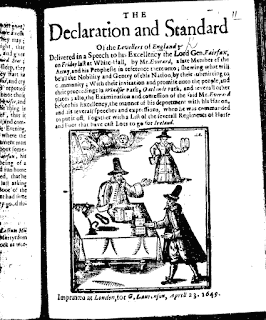A novel about Gerrard Winstanley (1609- 1676)
David Caute - 'Comrade Jacob'
Digger tract by William Everard from 1649 -courtesy Wikipedia- in public domain
Author and playwright David Caute ( born 1936) , attended seminars given by historian Christopher Hill at Oxford University in the late 1950's. Christopher Hill (1912-2003) , one time master of Balliol College, a Communist who broke with the more orthodox party line following the 1956 Soviet invasion of Hungary, depicted the British Civil Wars as 'The English Revolution' -the title of his first book published in 1940. Hill became a specialist in the study of the Puritanism, and also the radical sects associated with the Commonwealth. And so the young David Caute was introduced to the Diggers, in particular their most famous thinker, Gerrard Winstanley, originally from Wigan. A group of land squatters, most known for establishing a commune at St George's Hill, near Cobham, Surrey in April 1649, the Diggers or True Levellers, were amongst radical groups of the Interregnum.The original community lasted a few months, after being wrecked by opponents in August 149. A second settlement was established at nearby Little Heath.
In 1961 David Caute's novel 'Comrade Jacob' , about Gerrard Winstanley was published. In 1972, Christopher Hill's seminal work on the radical sects of the time, 'The World Turned Upside Down' appeared. 'Comrade Jacob' became a play, adapted by John McGarth, and was the first production performed at the University of Sussex Gardner Arts Centre in 1969. In 1975, the film 'Winstanley' (based on 'Comrade Jacob' ) was released. The notion of the British Civil Wars as a revolution with the sects being some sort of vanguard, is influential.
A folk ballad, 'The Diggers Song ( 'Ye Noble Diggers All ) , with lyrics first published in 1894, has been recorded by several artists including Billy Bragg, Chumbawamba, Lady Maisery. From 1965-1968 the San Francisco Diggers performed street theatre and gave out free food at Haight Ashbury. There is has been an annual Diggers Festival in Wigan, Lancashire, celebrating the local connection to Gerrard Winstanley for several years now. And Winstanley's notion of the earth being a 'common treasury' resounds now.
Reading 'Comrade Jacob' several decades on, found it rather good. Remarkably free from sloganeering and dogma. Winstanley is shown to be humanitarian, compassionate, inspiring and visionary, whilst at the same time annoying and self-righteous. The Diggers are courageous but are facing incredible odds. Getting attacked by a band of hostile soldiers, resented by many local people. The standard problems of communal living emerge with some of the hill dwellers simply wanting to contribute less than others. Their community still needs money simply to buy goods that it can not produce. Which means finding a benefactor, who has their own agenda.
General Fairfax, stationed nearby, but dreaming of retiring to his native Yorkshire, is portrayed has having a sense of fair play and tolerance . A local parson John Platt, debates theology with Winstanley, yet soon becomes hostile , paralleling tensions between the Church and the new radical sects. The poet Robert Coster also appears in the novel.
And what is particularly endearing is that David Caute himself, interview in 'The Guardian' in17th October 2008, tactfully acknowledging the dedication and commitment of everyone involved in the 'Winstanley' film, yet expressed his differences of opinion at the time of the project : Feeling that the religious and mystical inspirations evident in Winstanley's life were left out in favour of the political, quite a contrast to 'Comrade Jacob'.
Links
Surrey Diggers Trail
San Francisco Diggers
David Caute on Winstanley film 'The Guardian' article 2008
British Civil Wars entry for The Diggers
British Civil Wars entry for the writing of Winstanley
UPDATE 6th January 2020
'A Burnt Ship' will see further posts in 2020, but currently working on new project 13th century history blog



Comments
Post a Comment